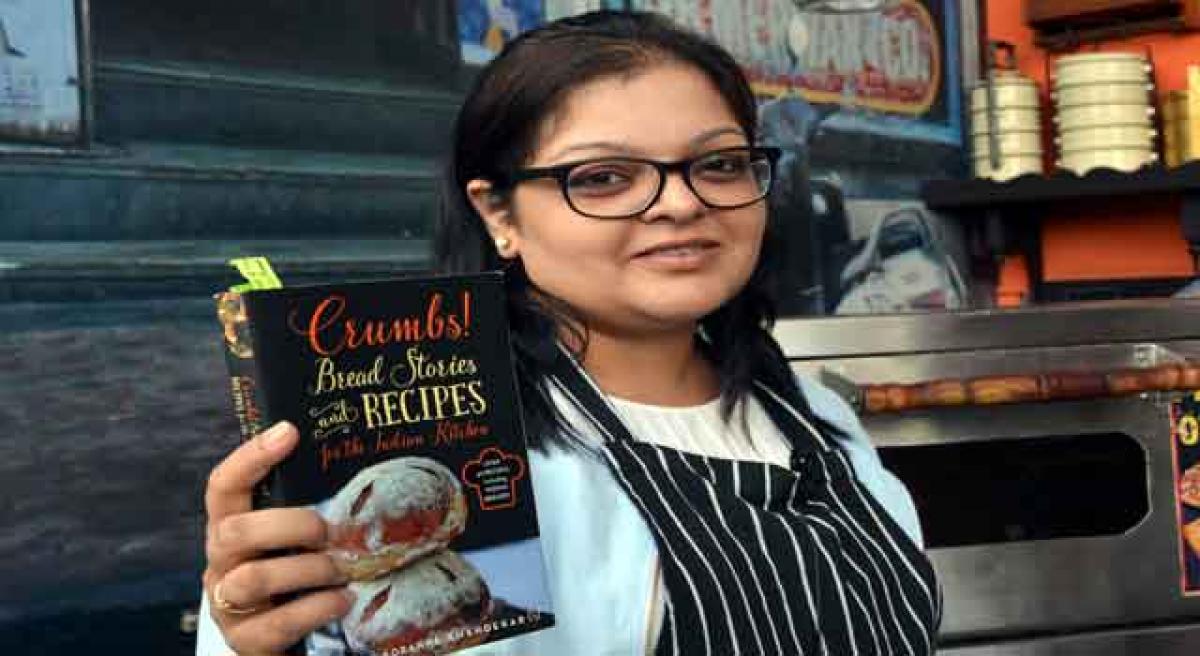Live
- Chanchalguda Jail Officials Say They Haven't Received Bail Papers Yet, Allu Arjun May Stay in Jail Tonight
- BJP leaders present evidence of illegal voters in Delhi, urge EC for swift action
- Exams will not be cancelled: BPSC chairman
- Nagesh Trophy: Karnataka, T.N win in Group A; Bihar, Rajasthan triumph in Group B
- YS Jagan condemns the arrest of Allu Arjun
- Economic and digital corridors to maritime connectivity, India and Italy building vision for future, says Italian Ambassador
- SMAT 2024: Patidar's heroics guide Madhya Pradesh to final after 13 years
- CCPA issues notices to 17 entities for violating direct selling rules
- Mamata expresses satisfaction over speedy conviction in minor girl rape-murder case
- Transparent Survey Process for Indiramma Housing Scheme Directed by District Collector
Just In

Mumbai-based Saee Koranne-Khandekar has been a food writer and consultant since 2008. Her primary interests include the study of breads, reviving traditional recipes, finding Indian alternatives to classic and contemporary baking and photography. Combining her many interests, she recently authored a book, ‘Crumbs – Bread stories and Recipes’.
Mumbai-based Saee Koranne-Khandekar has been a food writer and consultant since 2008. Her primary interests include the study of breads, reviving traditional recipes, finding Indian alternatives to classic and contemporary baking and photography. Combining her many interests, she recently authored a book, ‘Crumbs – Bread stories and Recipes’.
What inspired you to write the book?
‘Crumbs…’ is a book on bread. I had been teaching bread-making for a few years and realised that there is a clear lack of resources for the average Indian home baker to get acclimatised to bread-making.
The bread-making books bought from abroad ask for ingredients such as “strong white bread flour” and “vital gluten”, which are not easily accessible in India. There was no book that explained how bread dough would be affected in a largely hot and humid climate like that of India’s. That’s where the inspiration came from.
Why book on bread and not a cookbook?
Quite simply, because there are books and blogs on all possible subjects related to cooking except one on making bread in India. Also, I believe a book has to have a clear USP in today’s times when content is freely available on the internet.
How long did you take to write this book?
It took me about 2 years including researching, testing recipes, writing the narratives — all this while going through a complicated pregnancy.
What kind fo readership did you have in mind?
Largely, the home bakers. The language, the asks of the recipe, the format — everything is written keeping the novice bread maker in mind. Having said that, ‘Crumbs…’ is also a book that can be enjoyed by people, who don’t necessarily cook or bake but just like to read about food. This is because apart from the 40 odd recipes in the book, there are also narratives on bread traditions and features of bakeries and bakers from India.
Did the observations from the cooking classes help in writing this book?
Yes, it helped determine the problem areas that people have when interpreting a bread recipe from abroad or the basic techniques that stump them. I found that using references from everyday Indian cooking techniques (such as the science behind a dosa batter or the consistency of puri dough) made the technique easier to relate to.
What was the most challenging part about putting 'Crumbs…' together?
Testing recipes for different weather changes. A bread recipe that works in the Mumbai summer, will not work the same way in a Delhi winter, so I had to account for those temperature and humidity differences.
Which type of bread took you the longest to perfect?
Sourdough bread. Making a starter from scratch using Indian ingredients such as Punjabi chakki flour.
Saee shares the recipe for the yummy Surti Butter straight from her book
The delectable Surti Butter
Fresh or instant yeast 20g
sugar 7.5g
lukewarm water 300ml
maida 500g
salt 7.5g
cumin seeds 10g
margarine or butter 275g
Baking Tempo-200 C for first stage &120 c for second stage
Method:
- Place yeast and sugar in mixing bowl. Pour water and stir quickly and leave for 5 to 8 min.
- Mix remaining ingredients in large mixing bowl. Rub the fat into the flour.
- Add the yeast mixture to the flour mixture and knead to soft dough using required amount of water.
- Knead for 3 to 4 mins till the dough is light and soft and cover it for proofing for 1 hour.
- Knock back the dough and knead briefly. Portion small pieces of the dough {lime size} and place them on greased baking tray.
- Mist the top lightly with water to prevent premature crusting. Allow the balls to rise for an hour.
- Pre heat the oven for 200 C and place the baking tray for about 20 mins then reduce the temp to 120 and bake for more 30 to 40 mins.
- Cool completely on wire rack and store in air-tight jar for up-to 3 weeks.
By: Askari Jaffer

© 2024 Hyderabad Media House Limited/The Hans India. All rights reserved. Powered by hocalwire.com







